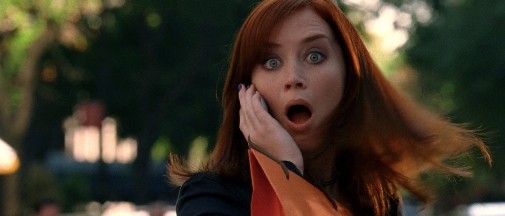
After over 100 write-ups about performers that came close to Oscar glory but failed to secure a nomination, it's time to discuss Emily Blunt in the Almost There series. Perpetually snubbed, the English actress has been part of the awards conversation since the mid-00s, but the Academy refuses to pay her any attention to this day. Even when her projects are otherwise embraced, Blunt's name is never there on Oscar nomination morning. Though this is her first time in this series, it's certainly not her last. There were at least five other occasions when she was in serious contention for Hollywood's most coveted trophy– going as far as winning the SAG and nabbing nods for all the important precursors. Since there's no better place to start than the beginning, let's delve into Blunt's first brush with Oscar buzz.
Back in 2006, The Devil Wears Prada was a smash hit with audiences and critics alike. Playing a character with her first name, Emily Blunt proved herself a comedic scene-stealer. And just like that, a star was born…
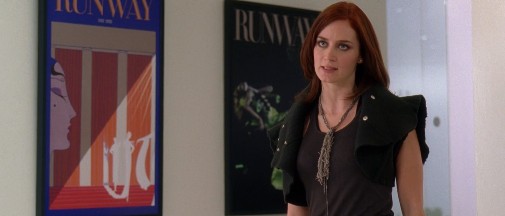
In this fictional skewering of Anna Wintour, Emily is the senior personal assistant to Meryl Streep's Miranda Priestley, the editor-in-chief of Runway magazine. If millions of girls would kill for the junior assistant job, then who knows what they'd do to be in Emily's designer shoes. As we discover the world of Runway through the eyes of Andrea "Andy" Sachs, played by Anne Hathaway, Emily is someone who intimidates as she moves through the fashionable cosmos with an air of imperious superiority, something befitting a woman in such an enviable position. She's professional and perfectly stylish, unexplainably British in the New York setting, but, if anything, that only adds to her prickly allure.
We first meet her in the morning when Andy goes for a job interview with Miranda, arriving early at the office before the titular devil is supposed to make her entrance. Regarding the decidedly unfashionable Andy, Emily is a vision of concentrated dismissiveness, the posh embodiment of an eye-roll whose every word drips with acid, caustic bon mots calibrated to sear off the top layer of the other woman's self-regard. And yet, even in this introduction, Blunt threads a dissonant line through the characterization's woven patterns. When mentioning her boss, there's a shot of breathless admiration, genuine vulnerability that hints at depths beneath the milieu of glossy surfaces and skin-deep beauty.
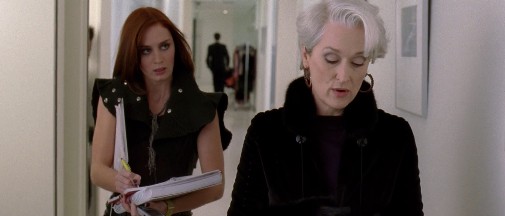
That quasi-tender annotation further sets the stage for Emily's mini-breakdown as Miranda shows up at the office earlier than expected. Blunt is brilliant at playing cold panic, which manifests in the pit of one's stomach, profoundly unsettling even though it never completely breaks the illusion of properness. All you see is the manic energy behind her eyes. A hurricane of controlled chaos, Miranda's first scene is an iconic entrance whose comedic potential depends on Blunt above everyone else. She's the barometer by which we come to understand the editor's reign of terror, checking on her overstressed frame for the dramatic temperature of any given moment.
The key to Blunt's success is how she never overplays her hand, negotiating every scene with dry wit and a brand of understated humor that rings essentially British. There's a musical precision to her efforts, comedy functioning like a fine-tuned symphony that still leaves space for character work. Not to belabor the point of Miranda's intro, but notice how Blunt performs fear and passive acquiescence to every microscopic humiliation. She shows how the words hit home but never perturbs her superior, playing one truth to the camera and another to Streep. In that sense, the symphonic acting gains the dimension of danced choreography.
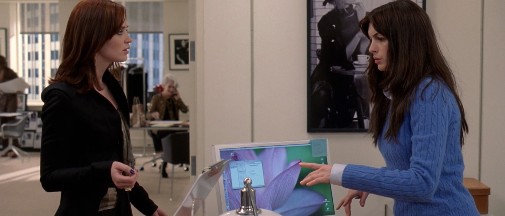
Moreover, whatever multidimensionality Blunt establishes for Emily guides the viewer to comprehend the movie's narrative and how the first assistant figures in that. As we'll see, this same need to please with no push-back, the gormless submissiveness before her boss, will end up costing Emily the older woman's approval. Here, the actress plants the seeds for her character's downfall. But of course, that's still far away in the future. Meanwhile, The Devil Wears Prada's first act sees Emily at the top of her game, forever overworked but always perfectly efficient, a well-oiled machine in killer heels and cracking timing – every catty comment lands, every zinger sings.
Structurally, this act also saddles Blunt with a whole lot of exposition. Training Andy, Emily is constantly spouting important information a mile a minute while maintaining a sharp mean girl attitude. Although, like in the opening, there are indications of fallibility, chinks in the armor that set the stage for what's to come. Look at the girlish enthusiasm Emily lets through when discussing Paris and fashion week. Her entire face lights up, the blue steel melting away into a genuine smile if only for one fleeting instant. This is how you deliver a lean, mechanically unimpeachable, and deeply hilarious performance where not a second is wasted.
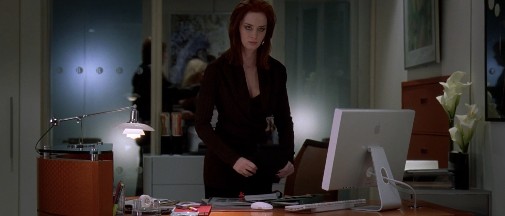
That's especially important when one takes into account how much of Blunt's meager screentime is spent running around in the background, often out of focus and reacting silently to whatever's happening to Andy. She doesn't have a personal life that we can grasp, but the performance is littered with slight suggestions of one. Babbling about her father's visit, Andy inquires about her colleague's late-night plans. Consider the scathing rebuke Emily shoots down. Blunt utters a short affirmative verging on rudeness with such sullen conviction that it's impossible not to wonder what's happening behind her smoky-eyed façade. Never taking the lead of any scene, she's a consummate scene-stealer, a supporting player who wears that title with pride.
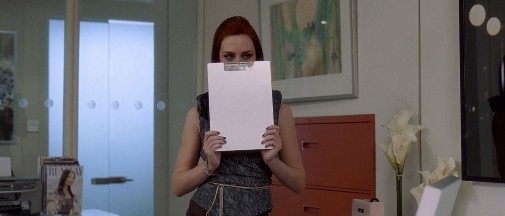
Before Emily's final disgrace, two moments showcase Blunt's precise comedy acting. First, there's the Harry Potter day, when Andy is given an impossible task, and the first assistant finds herself in the position of rooting for her underling from the sidelines. But of course, she does it with minimum enthusiasm and much irony. Then, there's the Met Gala, when Emily is down with a cold but still glamorous and present if hanging by a thread, splendorous in Valentino. Again, Blunt gets the most out of every line delivery while telegraphing Emily's weak state, the shame at her blunders, and newfound sense of camaraderie with Andy. At this moment, they feel like equals.
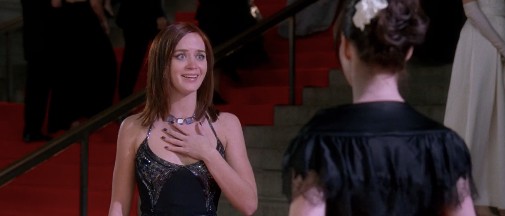
Still, for Miranda, there's no equity, and the assistant hierarchy is everlasting – it's just that Andrea has overtaken Emily now. This changing order is illustrated by the choice to take the junior worker to Paris rather than her senior, something Miranda makes Andrea tell her colleague by phone, inadvertently leading to Emily's unfortunate meeting with a cab. After a flash of physical comedy, Blunt gets what would have been her Oscar clip, simpering with overflowing indignation on her hospital bed. Even in the pits of misery, the actress is still funny, weaponizing the character's discontent while making us see she doesn't quite have the killing instinct Miranda sees in Andrea. She gets one last scene, a happy coda with teary eyes and a glimmer of sisterly connection – a beautiful note to finish one small comedic tour de force.
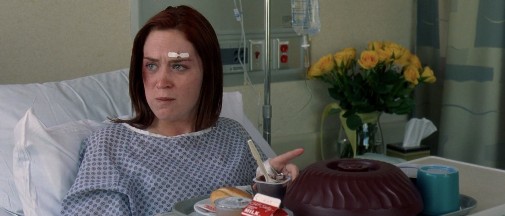
Though nominated for two Oscars, in the Best Actress and Costume Design races, The Devil Wears Prada failed to secure any Academy love for its stellar supporting cast. That's not to say Emily Blunt went through that awards season with no plaudits – quite the contrary. The brilliant turn earned her nods to the BAFTAs and Golden Globes, as well as a handful of regional critics' honors. As for the Academy's Best Supporting Actress category, the lineup included Adriana Barraza in Babel, Cate Blanchett in Notes on a Scandal, Abigail Breslin in Little Miss Sunshine, Jennifer Hudson in Dreamgirls, and Rinko Kikuchi in Babel. It was a year ripe with category fraud, leaving no space for a legitimate supporting actress to get deserved recognition. Fittingly, the Dreamgirls' lead won the Best Supporting Actress. Oscar. Emily Blunt is still waiting for her first nomination.
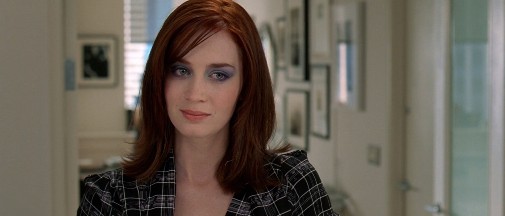
You can find The Devil Wears Prada streaming on Hulu. Alternatively, the film can be rented on various platforms.